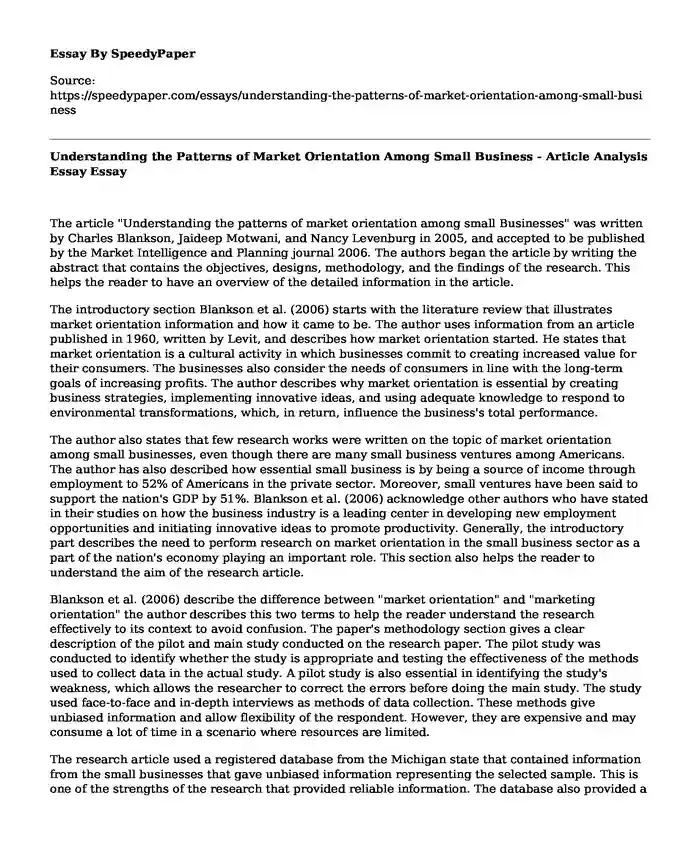
| Type of paper: | Essay |
| Categories: | Business management Business strategy Business communication |
| Pages: | 3 |
| Wordcount: | 824 words |
The article "Understanding the patterns of market orientation among small Businesses" was written by Charles Blankson, Jaideep Motwani, and Nancy Levenburg in 2005, and accepted to be published by the Market Intelligence and Planning journal 2006. The authors began the article by writing the abstract that contains the objectives, designs, methodology, and the findings of the research. This helps the reader to have an overview of the detailed information in the article.
The introductory section Blankson et al. (2006) starts with the literature review that illustrates market orientation information and how it came to be. The author uses information from an article published in 1960, written by Levit, and describes how market orientation started. He states that market orientation is a cultural activity in which businesses commit to creating increased value for their consumers. The businesses also consider the needs of consumers in line with the long-term goals of increasing profits. The author describes why market orientation is essential by creating business strategies, implementing innovative ideas, and using adequate knowledge to respond to environmental transformations, which, in return, influence the business's total performance.
The author also states that few research works were written on the topic of market orientation among small businesses, even though there are many small business ventures among Americans. The author has also described how essential small business is by being a source of income through employment to 52% of Americans in the private sector. Moreover, small ventures have been said to support the nation's GDP by 51%. Blankson et al. (2006) acknowledge other authors who have stated in their studies on how the business industry is a leading center in developing new employment opportunities and initiating innovative ideas to promote productivity. Generally, the introductory part describes the need to perform research on market orientation in the small business sector as a part of the nation's economy playing an important role. This section also helps the reader to understand the aim of the research article.
Blankson et al. (2006) describe the difference between "market orientation" and "marketing orientation" the author describes this two terms to help the reader understand the research effectively to its context to avoid confusion. The paper's methodology section gives a clear description of the pilot and main study conducted on the research paper. The pilot study was conducted to identify whether the study is appropriate and testing the effectiveness of the methods used to collect data in the actual study. A pilot study is also essential in identifying the study's weakness, which allows the researcher to correct the errors before doing the main study. The study used face-to-face and in-depth interviews as methods of data collection. These methods give unbiased information and allow flexibility of the respondent. However, they are expensive and may consume a lot of time in a scenario where resources are limited.
The research article used a registered database from the Michigan state that contained information from the small businesses that gave unbiased information representing the selected sample. This is one of the strengths of the research that provided reliable information. The database also provided a convenient sampling tool since all registered ventures that were written in the database were equally selected. However, the article's data analysis technique is not clearly defined. The article used inductive reasoning that was dependent on the literature. This approach lacks the exact meaning of qualitative analysis. Blankson et al. (2006) does not also give detailed information on how inductive reasoning was done. The writer also refers to previous research done by Blankson and Omar (2002) and fails to give any information related to the current study. This shows biasness and creates mistrust of the illustrated concept. The article results cover various aspects based on organizational fields such as top management, market intelligence, organizational systems, interdepartmental dynamics, and employees.
The case study provided can be played as a significant role in managerial and marketing practice aspects. Apart from offering support for marketing suitability and framework orientation in small business skills, the study plays a role in providing a well-defined framework offering clarity and better comprehension of best business practices within a small scale. The model also provides a clear logic framework according to the respective business practices. However, scholars in the previous studies have failed to incorporate the marketing orientation rationale and description concepts, leaving room for future studies to consider such study gaps to enhance the business market. One core concept realized from the study6 is that small business owner is most likely to device varying marketing plans depending on their determination, expertise, and skills while incorporating available resources relative to their business scale. Small businesses are also expected to use constant elimination rather than using positioning strategies in their place. Therefore, to develop a better business plan, aspects such as resources and the business's scale must be evaluated before implementing any marketing plan.
Reference
Blankson, C., Motwani, J. G., & Levenburg, N. M. (2006). Understanding the patterns of market orientation among small businesses. Marketing Intelligence & Planning, 24(6), 572-585.
Cite this page
Understanding the Patterns of Market Orientation Among Small Business - Article Analysis Essay. (2023, Dec 27). Retrieved from https://speedypaper.com/essays/understanding-the-patterns-of-market-orientation-among-small-business
Request Removal
If you are the original author of this essay and no longer wish to have it published on the SpeedyPaper website, please click below to request its removal:
- Essay Sample on NextGen Program
- Robert Mondavi Case Analysis Essay Sample
- Paper Example: What Marketing Strategy Is Pepsi Using?
- Paper Example: Reading and Understanding the Content
- Paper Example: Company Policy
- Free Essay: Using and Disclosing Personal Health Information
- Essay Sample - Navigating Change: The Dynamic Forces Shaping the Modern Hospitality Industry
Popular categories




